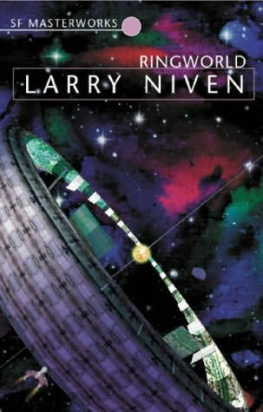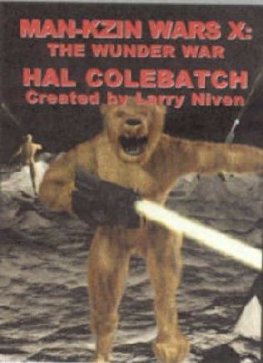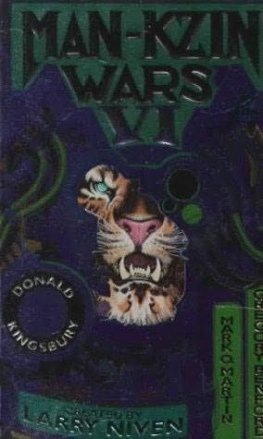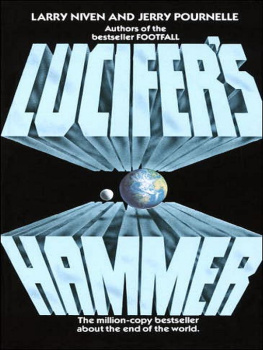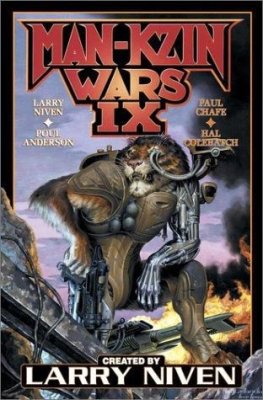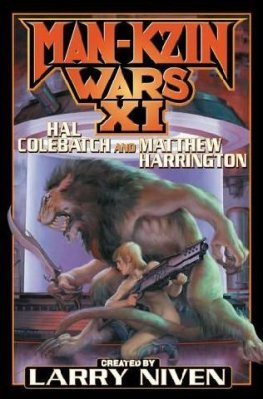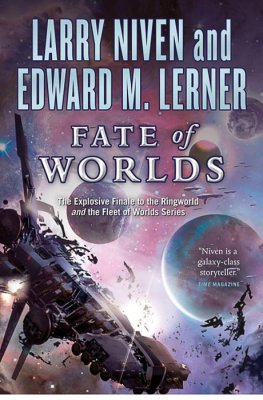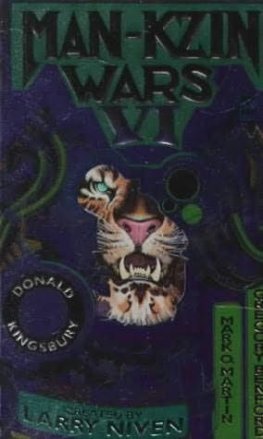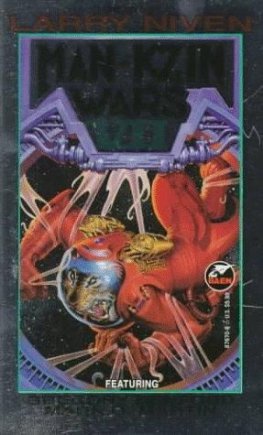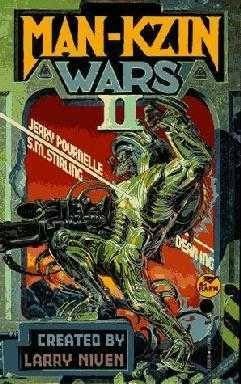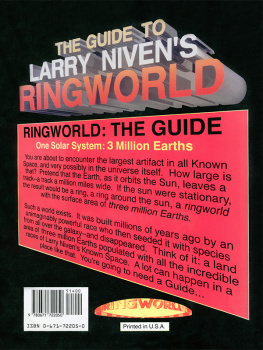RINGWORLD
by Larry Niven
If you find and correct errors in the text, please update the version number by 0.1 and redistribute.
CHAPTER 1 -- Louis Wu
In the nighttime heart of Beirut, in one of a row of general-address transfer booths, Louis Wu flicked into reality.
His foot-length queue was as white and shiny as artificial snow. His skin and depilated scalp were chrome yellow; the irises of his eyes were gold; his robe was royal blue with a golden steroptic dragon superimposed. In the instant he appeared, he was smiling widely, showing pearly, perfect, perfectly standard teeth. Smiling and waving. But the smile was already fading, and in a moment it was gone, and the sag of his face was like a rubber mask melting. Louis Wu showed his age.
For a few moments, he watched Beirut stream past him: the people flickering into the booths from unknown places; the crowds flowing past him on foot, now that the slidewalks had been turned off for the night. Then the clocks began to strike twenty-three. Louis Wu straightened his shoulders and stepped out to join the world.
In Resht, where his party was still going full blast, it was already the morning after his birthday. Here in Beirut it was an hour earlier. In a balmy outdoor restaurant Louis bought rounds of raki and encouraged the singing of songs in Arabic and Interworld. He left before midnight for Budapest.
Had they realized yet that he had walked out on his own party? They would assume that a woman had gone with him, that he would be back in a couple of hours. But Louis Wu had gone alone, jumping ahead of the midnight line, hotly pursued by the new day. Twenty-four hours was not long enough for a man's two hundredth birthday.
They could get along without him. Louis's friends could take care of themselves. In this respect, Louis's standards were inflexible.
In Budapest were wine and athletic dances, natives who tolerated him as a tourist with money, tourists who thought he was a wealthy native. He danced the dances and he drank the wines, and he left before midnight.
In Munich he walked.
The air was warm and clean; it cleared some of the fumes from his head. He walked the brightly lighted slidewalks, adding his own pace to their ten-miles-per-hour speed. It occurred to him then that every city in the world had slidewalks, and that they all moved at ten miles per hour.
The thought was intolerable. Not new; just intolerable. Louis Wu saw how thoroughly Munich resembled Cairo and Resht ... and San Francisco and Topeka and London and Amsterdam. The stores along the slidewalks sold the same products in all the cities of the world. These citizens who passed him tonight looked all alike, dressed all allke. Not Americans or Germans or Egyptlans, but mere flatlanders.
In three-and-a-half centuries the transfer booths had done this to the infinite variety of Earth. They covered the world in a net of instantaneous travel. The difference between Moskva and Sidney was a moment of time and a tenth-star coin. Inevitably the cities had blended over the centuries, until placenames were only relics of the past. San Francisco and San Diego were the northern and southern ends of one sprawling coastal city. But how many people knew which end was which? Tanj few, these days.
Pessimistic thinking, for a man's two hundredth birthday.
But the blending of the cities was real. Louis had watched it happen. All the irrationalities of place and time and custom, blending into one big rationality of City, worldwide, like a dull gray paste. Did anyone today speak Deutsche, English, Francais, Espanol? Everyone spoke Interworld. Style in body paints changed all at once, all over the world, in one monstrous surge.
Time for another sabbatical? Into the unknown, alone in a singleship, with his skin and eyes and hair their own color, a beard growing randomly over his face ...
"Nuts," said Louis to himself. "I just got back from a sabbatical." Twenty years ago.
But it was wearing on toward midnight. Louis Wu found a transfer booth, inserted his credit card in the slot and dialed for Sevilla.
He emerged in a sunlit room.
"What the tanj?" he wondered, blinking. The transfer booth must have blown its zap. In Sevilla there should have been no sunlight. Louis Wu turned to dial again, then turned back and stared.
He was in a thoroughly anonymous hotel room: a setting prosaic enough to make its occupant doubly shocking.
Facing him from the middle of the room was something neither human nor humanoid. It stood on three legs, and it regarded Louis Wu from two directions, from two flat heads mounted on flexible, slender necks. Over most of its startling frame, the skin was white and glovesoft; but a thick, coarse brown mane ran from between the beasts necks, back along its spine, to cover the complex-looking hip joint of the hind leg. The two forelegs were set wide apart, so that the beast's small, clawed hooves formed almost an equilateral triangle.
Louis guessed that the thing was an alien animal. In those flat heads there would be no room for brains. But he noticed the hump that rose between the bases of the necks, where the mane became a thick protective mop ... and a memory floated up from eighteen decades behind him.
This was a puppeteer, a Pierson's puppeteer. Its brain and skull were under the hump. It was not an animal; it was at least as intelligent as a man. And its eyes, one to a head in deep bone sockets, stared fixedly at Louis Wu from two directions.
Louis tried the door. Locked.
He was locked out, not in. He could dial and vanish. But it never occurred to him. One does not meet a Pierson's puppeteer every day. The species had been gone from known space for longer than Louis Wu had been alive.
Louis said, "Can I help you?"
"You can," said the alien ...
... in a voice to spark adolescent dreams. Had Louis visualized a woman to go with that voice, she would have been Cleopatra, Helen of Troy, Marilyn Monroe, and Lorelei Huntz, rolled into one.
"Tanj!" The curse seemed more than usually appropriate. There Ain't No Justice! That such a voice should belong to a two-headed alien of indeterminate sex!
"Be not frightened," said the alien. "Know that you can escape if need be."
"In college there were pictures of things like you. You've been gone a long time ... or so we thought."
"When my species fled known space, I was not among them," the puppeteer replied. "I remained in known space, for my species had need of me here."
"Where have you been hiding? And where on Earth are we?"
"That need not concern you. Are you Louis Wu MMGREWPLH?"
"You knew that? You were after me, in particular?"
"Yes. We found it possible to manipulate this world's network of transfer booths."
It could be done, Louis realized. It would take a fortune in bribe money, but it could be done. But -- "Why?"
"That will take some explanation --"
"Aren't you going to let me out of here?"
The Puppeteer considered. "I suppose I must. First you should know that I have protection. My armament would stop you should you attack me."
Louis Wu made a sound of disgust. "Why would I do that?"
The puppeteer made no answer.
"Now I remember. You're cowards. Your whole ethical system is based on cowardice."
"Inaccurate as it is, that judgment will serve us."
"Well, it could be worse," Louis conceded. Every sentient species had its quirks. Surely the puppeteer would be easier to deal with than the racially paranoid Trinocs, or the kzinti with their hair-trigger killer instincts, or the sessile Grogs with their ... disturbing substitute for hands.
The sight of the puppeteer had jarred loose a whole attic full of dusty memories. Mixed with data on the puppeteers and their commercial empire, their interactions with humanity, their sudden and shocking disappearance -- mixed with these were the taste of Louies first tobacco cigarette, the feel of typewriter keys under clumsy, untrained fingers, lists of Interworld vocabulary to be memorized, the sound and taste of English, the uncertainties and embarrassments of extreme youth. He'd studied the puppeteers during a college history course, then forgotten about them for one hundred and eighty years. Incredible, that a man's mind could retain so much!

